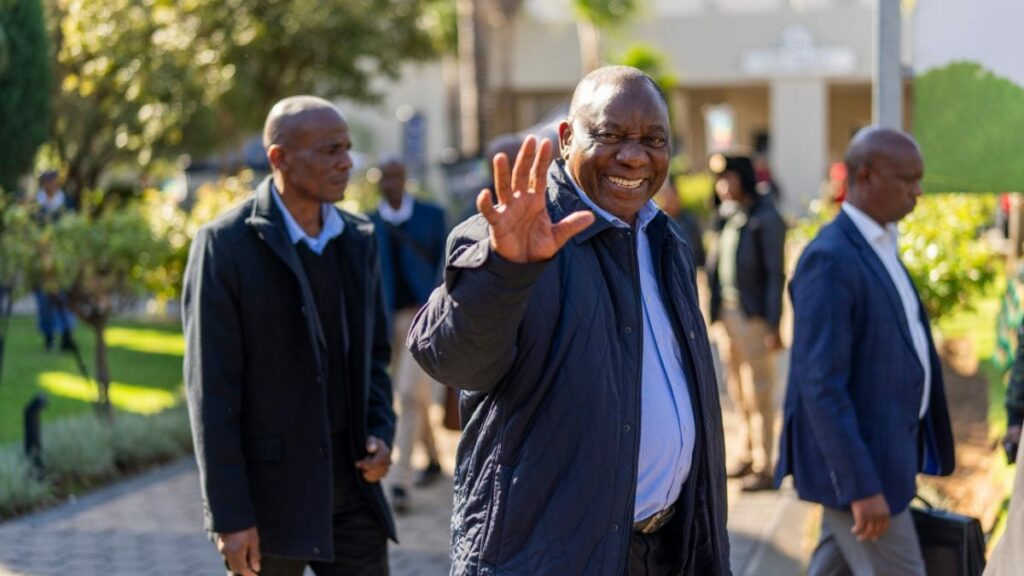South African president Cyril Ramaphosa waves as he arrives to meet with senior officials of his African National Congress party during the ANC’s National Executive Committee, 6 June, 2024 in Johannesburg, South Africa. AP
South Africa’s Parliament is gearing up to select a new president on Friday, with major political parties currently ironing out the final details of a potential coalition agreement. This agreement may determine whether Cyril Ramaphosa secures a second term as the leader of Africa’s most industrialised economy.
The situation appears to be heading down to the wire, especially after Ramaphosa’s African National Congress (ANC) announced plans for a meeting of its top officials in Cape Town on Thursday night. This meeting comes just 12 hours before Parliament convenes to initiate the presidential selection process.
Since the ANC lost its three-decade majority in the recent election, South Africa has been grappling with a political impasse. This has compelled the ANC to engage with other parties in pursuit of a governing agreement, marking the first time such collaboration would be necessary. While the ANC’s primary objective is to secure Ramaphosa’s re-election, it now requires assistance from other lawmakers due to its diminished parliamentary presence.
As of now, no definitive coalition agreement has been declared, and the ANC’s internal leadership must also formally approve any coalition arrangement. Here’s an overview of the most significant political negotiations in South Africa in the past three decades.
How is the president elected in South Africa?
South Africans elect a new parliament every five years, casting their ballots for parties who are allocated seats based on their share of the vote. Those lawmakers then elect the president. Because the ANC had a majority ever since the end of white majority rule under the apartheid system in 1994, the vote for president was previously a formality and was always the ANC leader.
The leader of Inkatha Freedom Party, Velenkosi Hlabisa, waves to the crowd during an election rally in Richards Bay, near Durban, South Africa, 26 May, 2024. AP
This time is different. Ramaphosa, 71, could still get a smooth ride to a second term if he is the only candidate nominated in Parliament on Friday — he’d then be automatically reelected. But if another candidate or candidates are nominated, a vote follows, and the ANC would need its coalition partners to secure Ramaphosa’s reelection.
The first piece of the puzzle
The Inkatha Freedom Party announced Wednesday night that it would join the ANC’s proposed “government of national unity,” the first piece of the coalition puzzle.
It backed Ramaphosa for a second term. But the IFP only holds 17 seats in the 400-seat lower house of Parliament that elects the president and the ANC needs others to get to the critical point where they have a joint majority.
The key piece of the puzzle
The main opposition Democratic Alliance now holds the key with its 87 seats, the second highest number behind the ANC’s 159. The DA has not confirmed that it has joined the unity government, although it has previously said it is willing. It says it just needs to work out the details with the ANC. That is the crucial negotiation, and those talks were expected to continue on Thursday. An ANC-DA-IFP agreement appears to be the core of any coalition now.
South African Democratic Alliance opposition leader John Steenhuisen, center, arrives at the formal announcement of the results in South Africa’s general elections at the National Results Operations Center in Johannesburg, South Africa, 2 June, 2024. AP
However, the DA has been the most critical voice of the ANC over the last 20 years and bringing the two parties together to co-govern is complicated. There is also some resistance within the ANC to forming an agreement with a party that it has viewed as its number one political foe for so long.
A look at the opposition to the coalition
Two other major parties, the new MK Party of former President Jacob Zuma and the far-left Economic Freedom Fighters, have said they will not join a unity government. MK also tried to get the Parliament sitting halted in court but lost its case. MK says its 58 new lawmakers will boycott Friday’s first sitting of the new Parliament but that shouldn’t affect any vote for president.
South Africa’s constitution says at least one-third of Parliament’s 400 lawmakers need to be present to attain a quorum and for votes to go ahead. The ANC holds more than one third of the seats on its own.
What will happen?
The chief justice will oversee the first part of the parliamentary session, when lawmakers are sworn in before electing the speaker and deputy speaker. Then comes the vote for president.
Former president and now leader of the MK Party, Jacob Zuma, looks on at the Results Operation Centre (ROC) in Midrand, Johannesburg, South Africa, 1 June, 2024. AP
There are 18 political parties represented in South Africa’s Parliament for this five-year term, from the ANC with 159 seats down to the Pan Africanist Congress of Azania, the GOOD party and the United Africans Transformation party with one seat each.
With inputs from AP
Find us on YouTube
Subscribe
Source link : https://www.firstpost.com/explainers/countdown-to-coalition-what-we-know-so-far-as-south-africa-races-to-elect-a-president-13782251.html/amp
Author :
Publish date : 2024-06-14 04:01:13
Copyright for syndicated content belongs to the linked Source.
